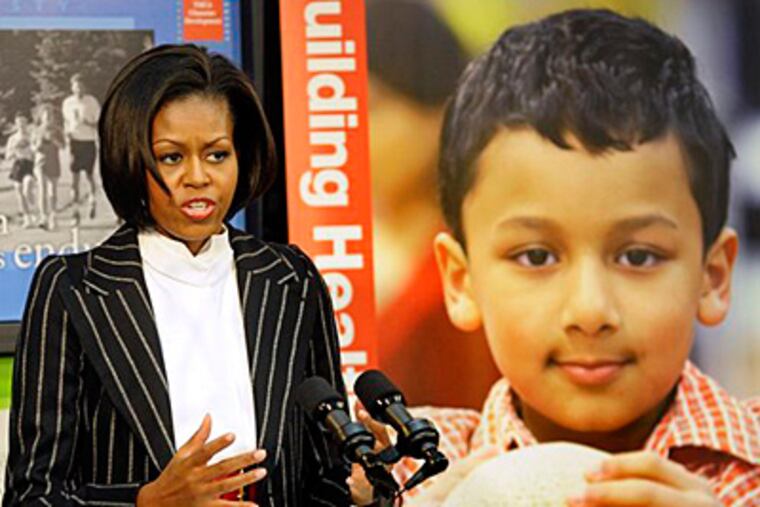First lady's campaign against childhood obesity
WASHINGTON - By now, it is clear that Michelle Obama loves french fries. The first lady talks about this "guilty pleasure" all the time, trying to ward off any notion that she is a nutrition nanny even as she cajoles Americans to eat better.

WASHINGTON - By now, it is clear that Michelle Obama loves french fries.
The first lady talks about this "guilty pleasure" all the time, trying to ward off any notion that she is a nutrition nanny even as she cajoles Americans to eat better.
Now her conversation with the public about the nation's health and fitness is about to get a lot more pointed.
After laying the groundwork for nearly a year, she will launch a campaign tomorrow against childhood obesity that she hopes will change the way millions of Americans eat, exercise, look and feel.
To succeed, she will have to take on powerful forces that have left one-third of children overweight:
Busy parents who hit the fast-food drive-through rather than cook a balanced dinner.
Schools where cafeteria meals compete with vending machines and a la carte lines stocked with soda and candy.
Food companies that spend billions hawking fatty and sugary snacks to kids.
Poor neighborhoods where nary a banana nor a head of broccoli can be found on store shelves.
The screens - computer, TV, video - that keep kids off their bikes.
The first lady's goal is ambitious: to put America on track to solve the childhood obesity problem in a generation. It's a far cry from the days when Dolley Madison, the first first lady to associate herself with a specific cause, helped to found a District of Columbia home for orphaned girls.
"Thank God it's not going to be solely up to me," Obama said, stressing that the solution will require more effort from parents, schools, businesses, nonprofit groups, health professionals and governments.
To underscore that point, she's bringing together Cabinet members, mayors, sports and entertainment figures, business leaders and more to announce the details of the administration's effort. That will involve promoting healthier schools, increasing physical activity for kids, improving access to healthy foods and giving people more nutrition information.
Health advocates couldn't be happier to have a popular first lady adopting childhood obesity as her cause. They're also aware of how difficult the problem will be to solve.
"You don't just go from epidemic obesity to epidemic leanness," says obesity expert David Katz, director of Yale University's Prevention Research Center.
Still, Katz says, Obama can provide the inspiration to help "shift the massive momentum of our society in the right direction."
Lofty goals have come and gone before.
A decade ago, the government's "Healthy People" program set a 2010 target that just 5 percent of children would be overweight or obese. The most updated government figures, released last month, weighed in at 32 percent for 2007-08. The childhood obesity rate has held steady in recent years, but at levels that still leave today's children on track to die younger than their parents.
The first lady has prepared for the obesity campaign by studying briefing papers, consulting with legislators, Cabinet members and policy experts, and speaking about the challenges that overstressed parents face in doing right by their children. And, famously, by hula hooping on the South Lawn to promote the need to get kids moving.
She says she spent the last year figuring out how to talk about all of this "in a way that doesn't make already overstressed, anxious parents feel even more guilty about a very hard thing." That's where the french fries come in, part of the first lady's message that nobody's perfect and that there's plenty of wiggle room in a healthy diet.
Obama caught some flak by talking about having to watch the weight of her own daughters, a sign of just how touchy the subject can be.
Clyde Yancey, president of the American Heart Association, said Obama's focus will help generate the "noise" needed to change attitudes. "Anything she can do would be helpful because the burden of the problem is just that profound," Yancey said.
"It has to be a pretty aggressive bully pulpit," says Jeff Levi, executive director of the Trust for America's Health, a Washington-based public health research organization.